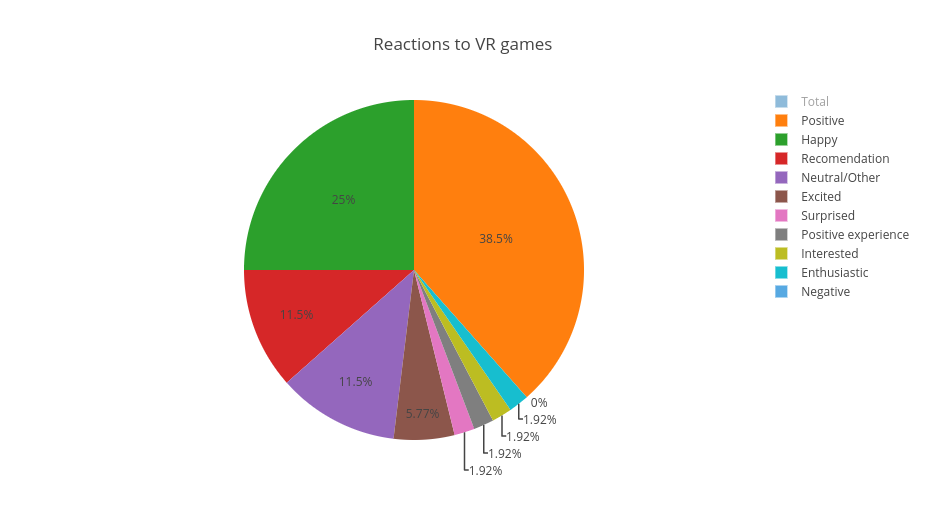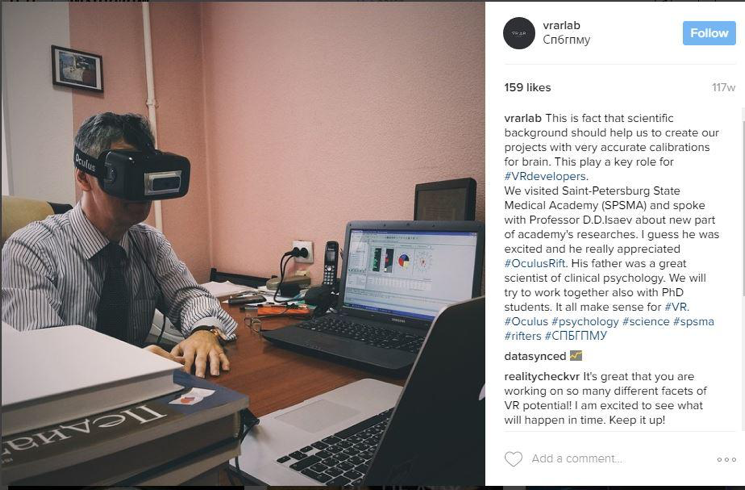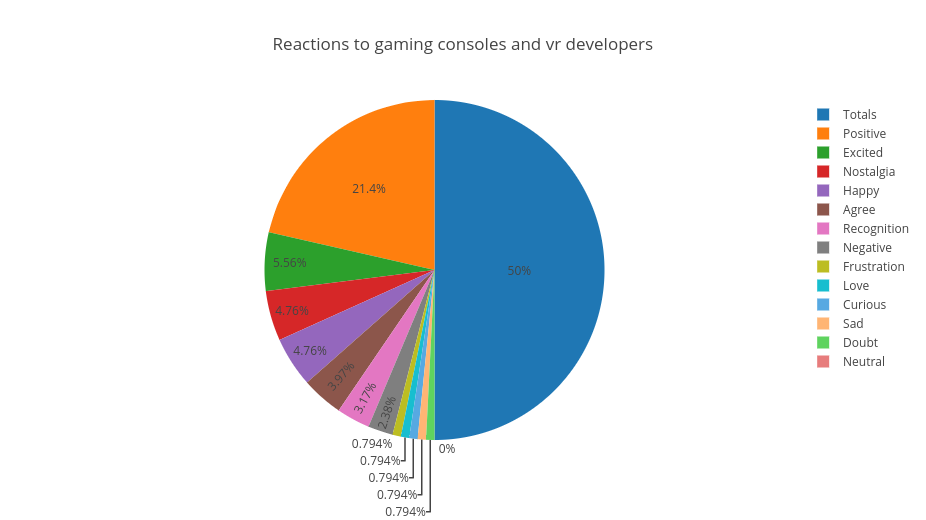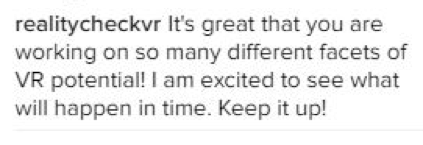This section will focus on answering the sub-question “What is the attitude of the target audience towards virtual reality in games and science fiction movies?” This question will be answered by means of netnography, a research method that essentially, focuses on delving into online communities.
In the previous section (Data scraping), the team identified three communities that could likely become the key players in the field of virtual reality cinema, these are namely ‘virtual reality gamers’, ‘science-fiction movie community’, and ‘producers of games’.
Using keywords, the teams will browse through Facebook to pinpoint several groups (Facebook pages) within these communities, and look into what they are currently talking about, and how strongly they relate to virtual reality cinema. Conclusively, the team will gather the most prominent comments, creating coding schemes, and determine whether the attitudes toward VR cinema are positive or negative, and if so, how should they be considered in the development of the VR cinema trend.
The team will use the programme Atlas to code different comments from different types of social media, one of the social media platforms we used was Facebook. We used Facebook because it is a very large online platform with over 1650 million active users online. (Facebook, n.d.) This is a good start for looking into the different VR communities that are present, especially in this generation where Facebook is now more popular than ever. Facebook is also well know for the fact that private and public communities can be made to help and share with other people that are interested in the same thing. People can comment and ‘like’ the posts that are placed in the community, this way we could see what type of people were getting involved and what they thought.
Furthermore, Facebook is also considered to be the platform the target audience of VR cinema (Dutch young adults) will be most likely to use to gather information about upcoming trends.
Online communities: Science-fiction communities
This section will focus on the science fiction communities the team found on Facebook. The reason why the team chose to research science-fiction communities was because it was believed that these communities would be the first in line to want to try out virtual reality cinema, acting as opinion leaders for the target audience, as they have a liking for futuristic movie themes (Marvel superheroes) and latest cinematic technology (IMAX).
Also, there is evidence that virtual reality is being introduced in the field of science-fiction movies, at least as a concept (Ranker, n.d.). Examples of this are movies like the Matrix and the Tron Legacy, which go about characters moving in virtual universes. This too gives a stronger reason why science-fiction communities would take a strong interest in VR cinema.
Marvel Studios
Searched and data collected on 14-03-2017
The Marvel Studios Facebook page was found by means of the keyword #Marvel. Marvel is a film company that busies itself with creating and producing new science fiction and superhero movies, more specifically, movies that are based on Marvel comics.
Marvel’s Facebook community is quite big, (about 1.079.111 followers). It is also quite easy to enter, just one click of a button, and you have instantly posts of Marvel in your Facebook feed. The activity in the feed is recent and is refreshed per day, round twenty-four hours there is a new post with comments. The community is heterogeneous; members are of different ages, gender and nationality. It is also interactive, followers and even non-followers can comment on a post. However, no one can post something on the page, as it is Marvel’s copyright.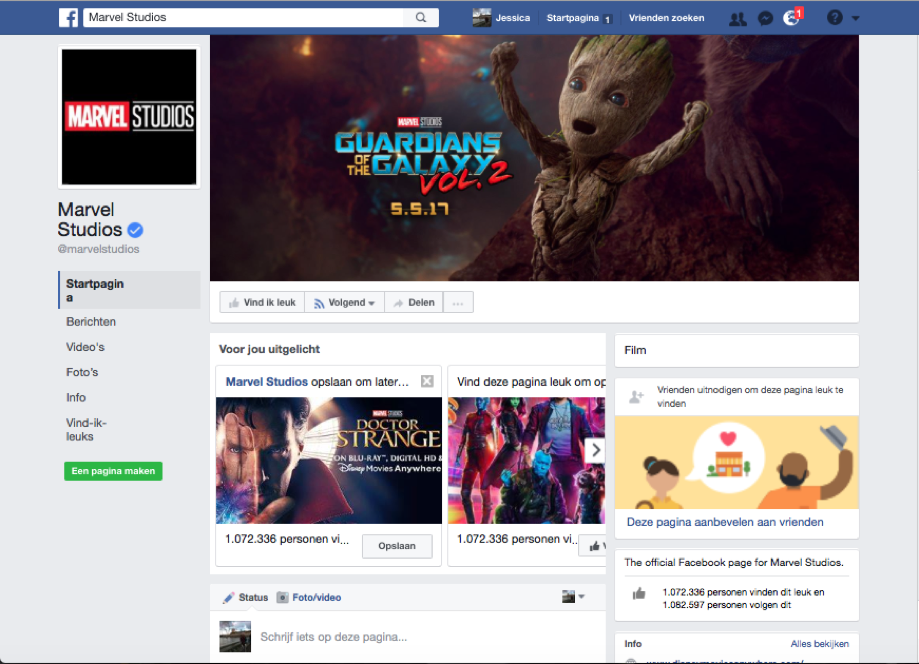
Posts go normally about upcoming Marvel movies – right now, Guardians of the Galaxy 2 and Doctor Strange are the most popular topics that are being talked about. A post can be a video snippet of a movie, or an image of a movie poster.
As for the (archived) data compiled for the research, the comments were straightforward, but it was difficult to find something related to VR cinema. The main reason for this is that VR cinema is not yet out there, so Marvel fans are not aware about it. People mostly talked about Marvel related topics, such as the upcoming movies, discussing actors and characters, etc.
However, this could be used to get a general idea as to which movies are currently popular and which could appeal to young adults, (that VR cinema could consider to screen). Right now futuristic themes seem to be the hot topic under Marvel members (Guardians of the Galaxy, and Doctor Strange, which goes about time-travelling).
Another finding was that members often complained how Hollywood fails to come up with new ideas and only reinvents old ones, and how they would like to see something new. Furthermore, there was also evidence of ‘motion sickness’, especially regarding the movie Doctor Strange, which one user quoted as having ‘fast colored images’.
IMAX
Searched and data collected on 14-03-2017
IMAX’s Facebook page was found by means of #IMAX. IMAX is a movie theatre network that busies itself with screening upcoming movies in the latest movie technology, currently 3D with a large high quality screen and sound.
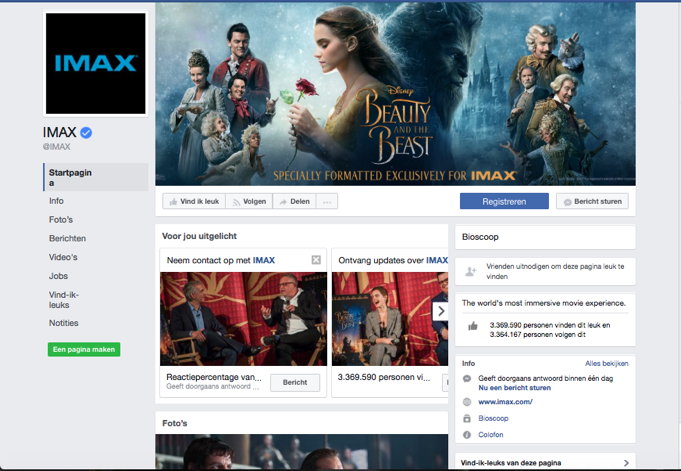
IMAX’s community is bigger than Marvel’s (3.364.167 followers). The community, too, is easy to enter (one click). The activity is recent and refreshed per day, the last post was 17 hours ago. The community is heterogeneous; members are of different ages, gender and nationality. Like Marvel’s it is also interactive, users can comment on a post but cannot create one.
The content of posts is similar to Marvel’s, there are video snippets of upcoming movies in IMAX version, or interviews with actors/movie directors, or even links to articles in which the movie is praised or more elaborated upon. As for the data (also archived), members were explicit in their comments, but it too was difficult to find something related to VR cinema. Therefore, VR cinema is also not well-known in this community.
Topics were similar as in Marvel’s community – members talked about the new King Kong movie, the actors mentioned in it – though members also mentioned more technological aspects than the Marvel members, such as the graphics and the high quality images in IMAX. Overall, most comments were highly positive about the IMAX movie experience and seemed eager to know what would come next, so this indicates that members could also become interested in VR cinema.
Conclusively, this too could be used to get a general idea as to which movies are currently popular, and maybe identify gaps that members are missing in IMAX, that VR cinema could improve and enhance.
360video
Searched and data collected on 14-03-2017
360video Facebook page was found by means of several keyword combinations, e.g. #film and #moviegeeks and #virtualreality, which led to Facebook pages that linked to this particular Facebook page with #360video. 360video is a community which posts 360 degree videos, and even interactive 360 degree images that users can scroll and look around as if they are in the scenery.
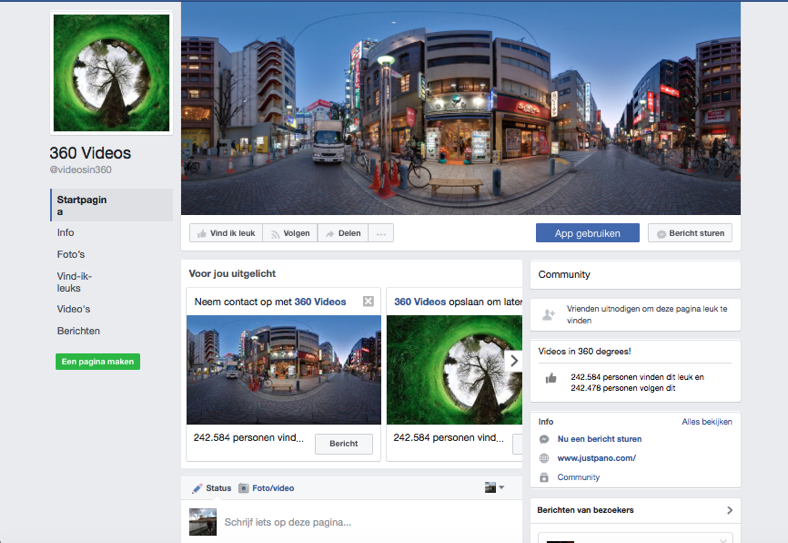
360video’s community is not large but also not small in size (242.478 followers). The community is easy to enter, one click. The activity is not very recent, last post was 8 February, though the content, as already stated before, is quite interactive. Members and non-members can also comment on posts, but not create them. The community is also heterogeneous, people differ in age, gender and nationality.
The content is quite different than the previous communities. Namely, people do not talk about movies, but they comment on 360 videos. Though most comments on the community’s posts were shares, so it can be said that people are enthusiastic about the interactive content and images they see, and they want other people to experience 360 degree videos as well.
Then again, VR cinema is not existent in this community. However, it can be noted that there is evidence that people like and share the 360 video experience, and that it shows a potential that people might like the virtual reality experience as well, which comes close upon. People also expressed awe and surprise towards the interactive content, but there were also comments that expressed motion sickness, such as ‘it is moving’.
Conclusively this community could give VR cinema an idea on how it can develop, since 360 degree is probably something it will be using. And perhaps, use this community as a test-channel, to know their opinion before making VR cinema known to the public.
TechRadar
Data searched and collected on 20-03-2017
The TechRadar Facebook page was found by typing in the keyword VR Cinema. TechRadar is an organization that provides information for upcoming technology, sends updates regarding social media changes and are a source for tech buying advice. In more details, they are pioneers in advocating and sharing about new technology, which can also include the movie industry.
The TechRadar page is relatively big, with around 525.083 followers. Moreover, the page is very easily accessible by everyone, and the activity in the news feed is constantly changing and being refreshed regularly. Thus, the community is heterogeneous, including members of both sexes and of various different age groups and geographic locations. However, discussion and posts between members are not included or permitted in the page, and all posts come from TechRadar themselves.
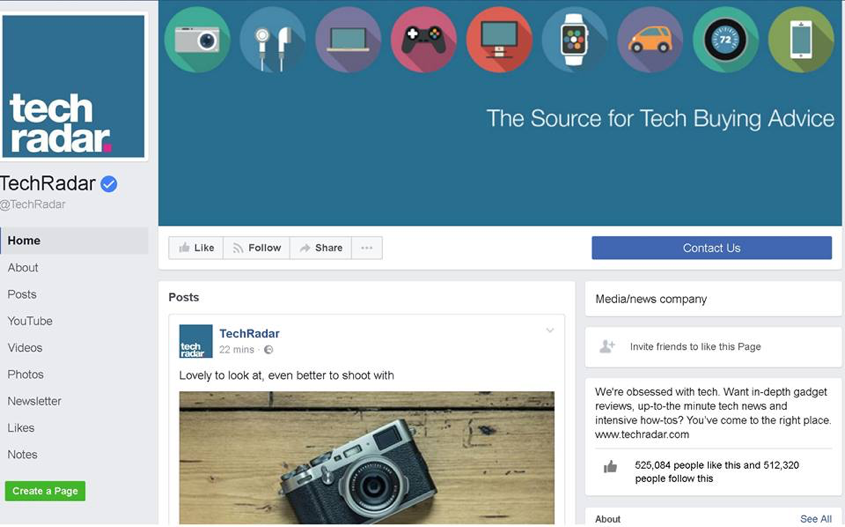
The most common posts on the page are about technological gadgets like Fujifilm camera X100 and Android wear 2.0. Interestingly however, the first post of the page was regarding the new Samsung Gear VR headset, which automatically conveys that the page is very active with regards to this topic. The overall discussions include news about upcoming technology in various areas, as well as reviews on latest releases in technology, such as the new Samsung Galaxy S8.In this way, members can regularly be posted about what is new and which particular technological trends are the most popular and successful.
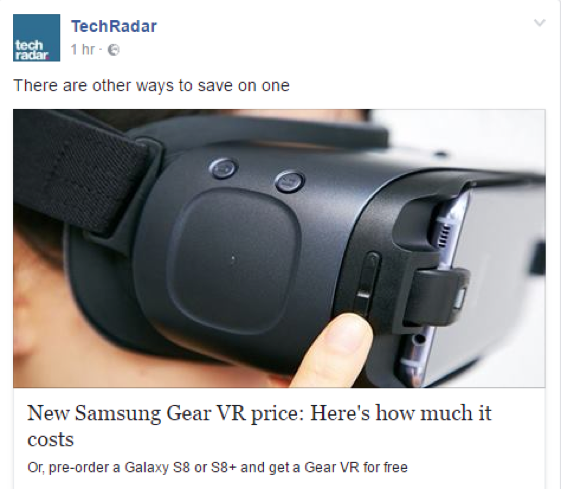
Star Trek: The Next Generation
Data searched and collected on 20-03-2017
The Star Trek page was found by entering the keyword Sci-fi. The page is official for the movie (copy rights), therefore it is a very big community, with around 1.513.811 followers. The page is extremely active, being refreshed very rapidly throughout the day. In it, many different images can be found about sci-fi, the Star Trek movie and various technological gadgets. Additionally, it includes many posts about interesting facts regarding the film, the actors and its production. Thus, there are many posts that show how the producers and creators of Star Trek invented technological gadgets that were used in the movie, are now really invented and being used in real life, like the VISOR device.
Alike the TechRadar page, the Star Trek page has posts only from the official page itself, however it is interactive in the sense that it is accessible to anyone, and people can comment o post and tag friends to participate.
The content of the majority of the posts found on the page are paying tribute to the actors and producers involved in the creation of the film, such as personal accomplishments and birthdays. The data collected (archived) from the comments of the members were mainly about discussions on the movie, discussions on new technology and science fiction in general.
Overall, this age demonstrates how people are still fascinated by new technological discoveries and how these can be showcased in cinema. Thus, it also shows how a technological idea that was once seen as a futuristic gadget in a movie is now actually being used and implemented in the real world.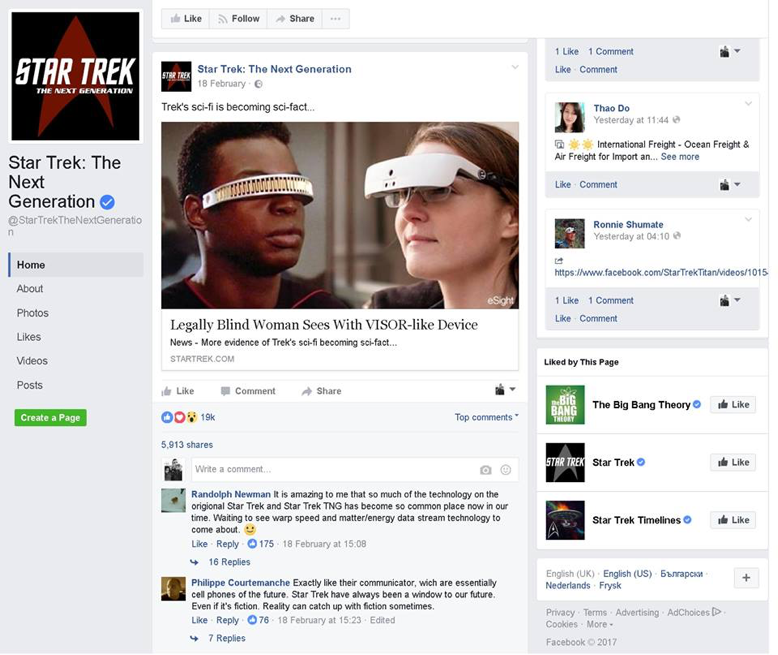
Movie Pilot
Data searched and collected on 20-03-2017
Lastly, the Movie Pilot Facebook page was found by searching the keyword Blockbusters. The page was one of the first major pages to pop up on screen, as it is a very big community involving roughly 5.862.232 followers.
Their mission is to create greatest online movie community by means of providing a forum for discussion. Similarly to the other pages, members cannot create their own posts, but they can share, comment and tag others to the discussions. The community within the Movie Pilot page is heterogeneous, including movie lovers of all ages, genders and nationalities. With this in mind, the page is not focused on technology itself, as there were no particular posts regarding VR. However, it can be found within the discussions and posts from the members (archived) what are the upcoming ideas and technology that movie producers and directors want to experiment with for releases in the upcoming years.
The content of the page consists of exclusive articles with movie directors and actors, as well as interesting facts about movies, new releases, videos of gag-reels (bloopers), and general gossip and rumours about the Hollywood and film industry. Also, members and fans can find rare photographs and GIFs of movie scenes and actors.
Conclusively, this community gave us an idea of how popular and loved the film industry is, and how even though the actual blockbuster stores do not exist anymore, the passion for film will always be present. In addition, it can serve as a platform for discussions on future implementations of VR technology in the cinema industry.
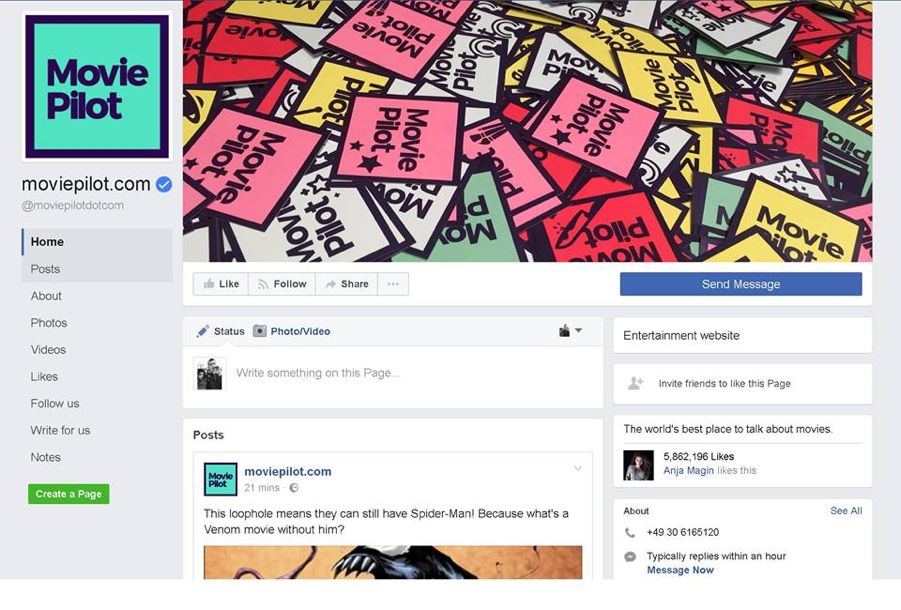
Below is a visual overview of all the reactions found in the different scifi-communities regarding the virtual reality cinema trend. Overall it can be seen that the communities are quite positive about virtual reality, however, there are also diverse opinions that regard the topic. These differences will be explained in the section key quotes and the frequency table.
Online communities: Gaming communities
VR gaming community
Searched and collected on 28.03.2017
For the virtual gaming community, we typed in three different main topics which were VR gaming, VR headset and VR games, and searched the different Facebook communities that were connected to these topics. We found different comment sections and took screenshots of the comments and placed them in the Atlas programme so that we could select the different comments and code them with positive and negative codes. In this case, there was no negative comments found in any screenshots that were taken. Most of the comments were positive such as people recommending things and showing their excitement.
The virtual reality gaming community on Facebook is a very large and open community. Whilst searching for different types of VR gaming communities, we came across private and public ones from all different types of countries. All of the comments that we found were positive, I think this has mainly to do with the fact that the only people that would join these types of communities are the people that like VR gaming and want to know more or share their experiences, tips and tricks on different types of games, gadgets and headsets. The positive comments were connected to the different links that people in the community placed, such as advertisements for new games and VR headsets, articles on different types of VR games available and VR gaming pictures.
The people in the community get very excited about this new gaming revolution and really enjoy reading people’s opinions about the different products available on the market. The people really liked the picture of a person wearing a VR headset and even shared the picture 15 times. This is an example of how these types of communities enjoy sharing opinions and interests, this is also a way of getting to know more people and becoming friends with the people online that have the same interests as you.
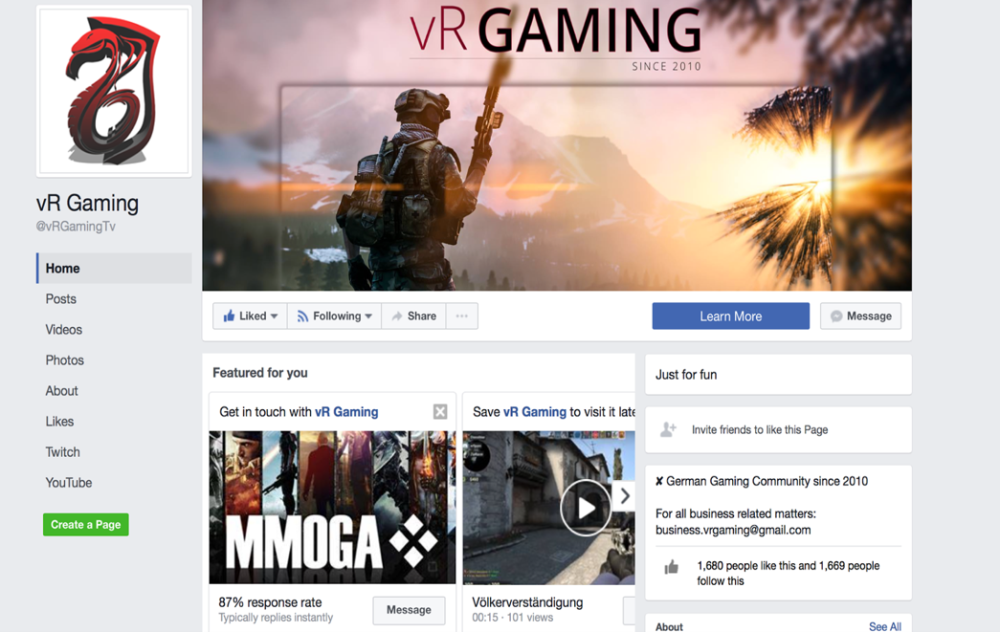
Gamingconsoles
Searched and collected on 25.03.2017
The hashtag “Gaming consoles” gave us an insight to the Gamer community. This particular group is important to us, because they are the early adopters of VR equipment and games provided. The size of this particular community is quite big since it ranged from the regular PC user to the more advanced players with a personal VR equipment rooms. Most of them were active participants, reacting to the posts by commenting and liking, on Instagram at least, while the ones on Facebook were more in the role if observers. There wasn’t a particular page or group, the players were mostly scattered all around social media but we were able to distinguish a big group on Instagram, who talked about their nostalgia over classic gaming consoles. It was quite hard to find anything straight to the topic we are researching but it was good to know how virtual reality can branch out.
At the end the results we got from this hashtag were that people enjoyed the classic consoles but with the new twist given by virtual reality.

Online communities: Virtual Reality Developers Community
VR developers
Searched and collected on 25.03.2017
Another community we found were the virtual reality developers. Even though the results with this particular hashtag were not that many for our subject, we still found out some interesting stuff. Users were quite active and had suggestions for companies on other uses for the technology like an application in the field of medicine and psychology. There was also one post about music videos shot with a 360 camera to create that virtual reality effect.
The comments we found were positive, encouraging the development of new solutions and ideas.
VRtechnology
Searched and collected on 25.03.2017
Searching for “VR technology” gave us an important insight into the Developers community. While on Instagram we barely touched the subject, here we managed to find out the rest of the information needed. We managed to determine the size of the community and their level of activity on Facebook. There were quite a few pages dedicated to technology, including Cyten, Trustico and a few more. This tells us the community is quite big since it includes not just the people who develop the technology itself but also influencers and opinion leaders. There were more posts from individual users and pages here but not many reactions. The people on Facebook were rather passive about the subject. Some of the posts appeared on Instagram as well. There, we could see some positive comments about the development of virtual reality technology but also quite a few negative.
One of the comments were concerned about the direction of vr technology, going for the development of sex toys in the future while another was quite hopeful about the applications in an office environment. Overall people reacted positively to any kind of advancement in the field and some even connected it to a Sword Art Online, an anime famous for its plot based on virtual reality and full submergence.
Even though it wasn’t about virtual cinema directly, the information we found was still useful to determine the level of acceptance of the developers and the consumers towards the progress in the area of virtual reality.
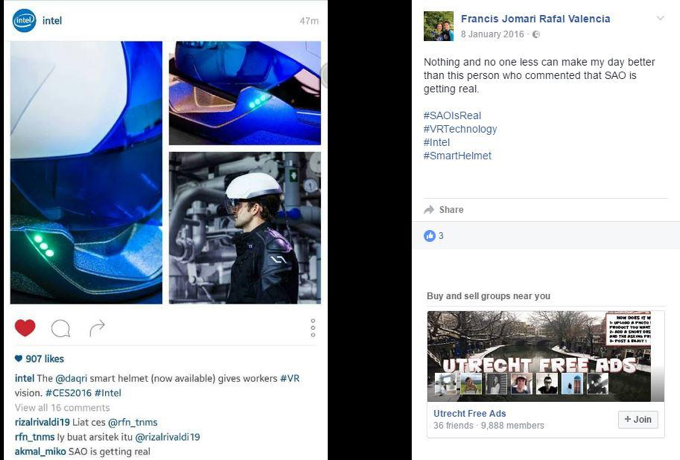
Key Quotes
| Gaming Community | |
| Positive |  
|
| Neutral/Other |   |
| Negative |
|
Overall the gaming communities have strong positive attitudes towards virtual reality. Most positive comments went about how members enjoyed the virtual reality experience in a gaming centre, or how excited they were about having VR gaming consoles hitting the gaming market, which they could use at home. One user even mentioned that movie theatres would be replaced by the rise of VR. Furthermore, there was not much evidence of negative comments towards VR except for maybe some nostalgia between users towards old gaming consoles, who might be considered to be more conservative in the old ways of gaming. Though it does not override the amount of positive comments. In short, gaming communities are open to VR and open to the change it brings along.
| Science Fiction Movie Community | |
|
Positive
|
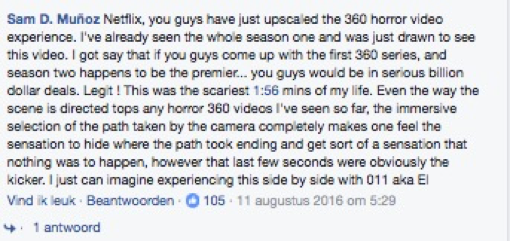
|
|
Neutral/Other
|
  |
|
Negative
|
  |
The science fiction community too, had strong positive attitudes towards virtual reality, or at least, elements of virtual reality. Users told they liked the 3D (IMAX) and the 360-degree experience very much. They were amazed, sometimes scared, but they enjoyed how the experience surprised them, and some even asked to see more of it.
Though the team also found more negative and indifferent comments in the sci-fi than in the gaming community. These negative comments went about virtual reality, but also towards the film industry itself. Some users were sceptical towards virtual reality, deeming it as uncomfortable, or as it is shown above, users were confused about how it works. Other users were frustrated about how Hollywood was just reinventing old ideas, e.g. ripping off Marvel comics, and feared the industry was running out of creative ideas, and how they would like to see something new every now and then. VR cinema could then play a role into relieving this frustration, and spice up the enthusiasm in these users, by enabling them to watch movies in a new and revolutionary way. However, there was also evidence of motion sickness, with one user stating having a headache.
To conclude, positive comments were the most abundant ones in this community. However, there are more negativities among users. VR cinema could provide more information on how virtual reality works to reassure users that are sceptical against it. Furthermore, it is likely VR cinema could appeal to users that feel indifferent or frustrated with Hollywood, because it is something that hasn’t been considered before, and therefore, it is something new. As for the motion sickness, VR cinemas could consider not to screen films that have fast-moving images, at least at first, so this problem is evaded, and users can get more easily accustomed to VR.
| Virtual Reality Developers | |
|
Positive
|

|
|
Neutral/Other
|
|
|
Negative
|
 |
As for the community of virtual reality gaming developers, the comments in this community were similar to the ones in the gaming community. A lot of users were excited about virtual reality as a new means for gaming, some even stating that it could be the future, by which it can be noted that virtual reality has potential on becoming something definite in this community. Users were awed about the VR gadgets and were also curious about how virtual reality actually works, though more in the positive sense than in the sceptical sense, as it was the case in the sci-fi community. There were no negative comments found regarding VR. Most negative comments went, like in the gaming community, about how nostalgic users felt that the old ways of gaming were over. Though it remains a question if they, despite this nostalgia, will still use virtual reality once it is already up and running in the market.
Frequency Table Atlas.ti

After coding all comments of the different search words gathered from the platform Facebook, the different codes were divided within 3 sub-group codes, namely: Positive, Negative and Neutral comments. With that, the group was able to obtain and measure the overall amounts collected for each of the code groups.
The accumulated data was then put into a frequency table. The table therefore shows that the most prominent types comments found in this platform regarding our three categories of research: VR Gaming, Sci-fi Community and gaming producers were positive comments. The table thus shows that 85 different types of positive comments, feelings and opinions were found within the different VR communities. This number also conveys that the general perception and emotions surrounding this topic are, for the most part, positive and optimistic. In contrast, 26 different types of negative comments were also found within these communities, which also illustrates that although VR technology is something that is exciting and extremely interesting, it Is a technology that is in some ways still in its infancy, therefore many alterations and adjustments still need to be done in order to expand it on a massive scale and expose it to all the public.
Finally, the table shows that there were 37 comments that were either indifferent or that it related to something else. However, for the most part, ‘other’ involved people tagging other friends on the post, sharing additional information about the topic, or exchanging of recommendations. In the same light, it could be understood that even if people didn’t have biased opinions on VR technology, they surely were interested and curious to find more about it and explore this unconventional and exhilarating world.
Conclusion
Although the concept of virtual reality is still an upcoming phenomenon it has already formed some distinct communities.VR is in itself a relatively new technology and has provided new scene for interaction. In order to understand the implications of this technology, one must first understand the concept (Onyesolu, 2016).
One of the main findings were that there are quite some developer communities active on social media. Software developers Marxent have demonstrated the vRetail platform, enabling VR to recreate and customize real-world stores, shelving and merchandising (Barnes, 2017). There has been a vRetail platform developed, this means there is animo for the concept of virtual reality, this means that this concept is getting attention not only from gamers or fans, but also from companies.
Another finding is that the comments on social media about virtual reality have been mostly positive, it is in comparison to positive comments almost rare to find negative comments. This could be because of the fact that the concept of virtual reality is still in its infancy. When considering all the positive comments the participants reported, this VR program is undoubtedly an asset for our Center for Cognitive Remediation and Rehabilitation (Amado, Brenugat-Herne, Desombre, Dos Santos, Krebs, Orriols, Piolino & Prost, 2016). It would be interesting to do measure this again in a few year to see how much virtual reality has grown and if the negative comments are still relatively low compared to the positive comments.


